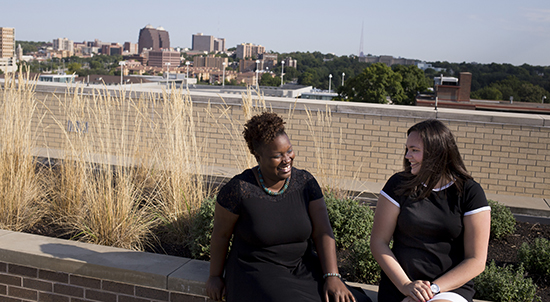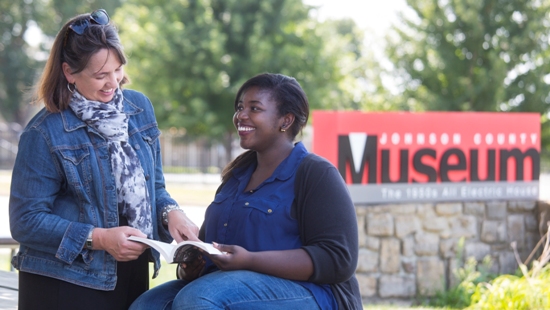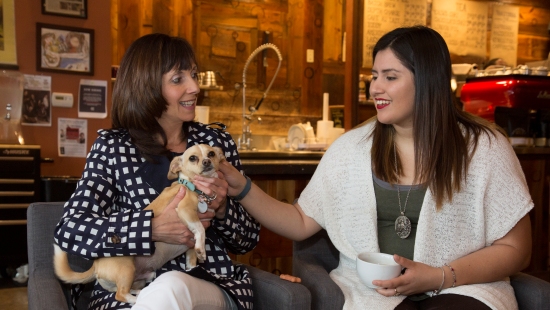UMKC faculty are leaders in their fields—and they’re within reach
With a student-to-faculty ratio resembling a small private college, UMKC makes mentorship a central part of the student experience. Though more than 16,000 students are enrolled, the 14:1 student-to-faculty ratio is unusually small for such a large university.
Here are five reasons why mentorship is crucial in college:
1. Reaching goals

Associate Professor Toya Like, left, and Madeline Warren enjoy their ongoing mentoring relationship and friendship.
“When faculty invest their time, energy and resources into students — especially those who might seem disconnected or having a difficult time with course material or navigating their university experience — it always pays off. It encourages the student to do well and allows him or her to see that they are not working toward their goals on their own; they have the support and backing of those pushing them to succeed.”
Toya Like, associate professor
Criminal Justice and Criminology
2. Navigating the system

Mona Lyne, left, has mentored Parker Webb since he was a UMKC freshman.
“Many students are juggling multiple roles, including family, work and school. Many are international students who may be new to life in America. Their ability to successfully manage these multiple roles and/or navigate a new culture already attests to their initiative and drive. In other words, they have high aspirations, but in many cases, less time and fewer other role models to look to in planning their future. A little extra assistance and guidance in navigating UMKC to ensure their future success can go a long way in helping them turn college into more than just a set of classes and a credential.”
Mona Lyne, associate professor
Political Science
3. Winning at research

Jane Greer, left, mentored Lerie Gabriel, who researched Corinthian Nutter, a pioneer in desegregating local schools.
“Undergraduate research is about students getting to do real academic, artistic, scientific work, to ask real questions that need to be answered — not just to absorb information in a classroom. Undergraduates can’t undertake that kind of authentic inquiry unless they have role models and mentors showing them the way, opening up the processes, and connecting them to resources.”
Jane Greer, Undergraduate Research director and professor
English Language and Literature
4. Cultivating excellence

Philosophy Professor Clancy Martin, right, mentors Sydney Harvey.
“It’s a kind of team you create to guide a person towards success, through working with that student’s talent; and also helping that student to meet other people and find other people and opportunities who can help the student develop her or his interests and excellence.”
Clancy Martin, professor
Philosophy
5. Sharing commonality

Associate Professor Viviana Grieco, left, mentors Edith Moreno. Grieco adopted Elvis, a Chihuahua mix, from Moreno.
“Students want to have an open conversation about their challenges without fear of being judged. They also want to talk to someone who understands where they are and what may be coming. Students also want guidance that comes from someone with some authority on the matter but willing to play that authority down to make the process less intimidating.”
Viviana Grieco, Avanzando mentor and associate professor
History
